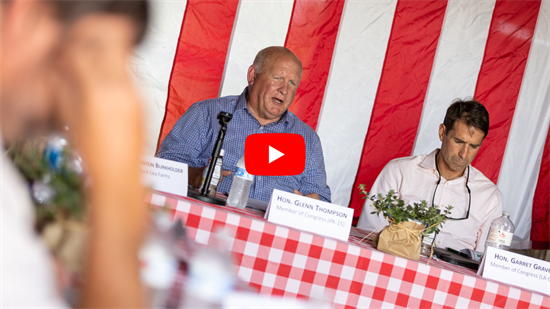In Case You Missed It
Thompson Hosts "Conservation With A Purpose" RoundtableMembers of Congress Gather at Chambersburg Dairy Farm
Washington,
July 20, 2022
On Friday, July 15, Congressman Glenn "GT" Thompson, Republican Leader of the House Agriculture Committee, hosted a roundtable discussion at Burk-Lea Farms in Chambersburg, Pennsylvania. The event was sponsored by the Energy, Climate, and Conservation Task Force, created by Republican Leader Kevin McCarthy last year to promote innovation, invest in clean energy infrastructure, and implement initiatives in natural solutions and conservation. Thompson was joined by Congressmen Garret Graves (LA-06), John Joyce (PA-13), David Valadao (CA-21), and John Rose (TN-06). Joining the conversation were Clint Burkholder, owner of Burk-Lea Farms, and representatives of the Maryland & Virginia Milk Producers Cooperative Association, Alliance for the Chesapeake Bay, and Pennsylvania Farm Bureau.
WATCH THE ROUNDTABLE DISCUSSION BELOW
Rep. Glenn "GT" Thompson: "The purpose of this task force and our visit here today is to champion the great conservation work the American farmer, rancher, and forester are already carrying out." Watch here >>> Rep. Garret Graves: "It's about doing things where you get the win-win—or the win-win-win—increasing agricultural outputs, improving our conservation measures or sequestration of greenhouse gases, improving efficiency, and it's ensuring economic activity and sustainability." Watch here >>> Rep. David Valadao: "When it comes to the Farm Bill and Washington, DC, we can't be fighting with each other and we can't let our regional battles get into the middle of these things. There's things that help all of us... When we draft these types of bills and the Farm Bill, we have to make sure our legislation is something that works for everyone across America." Watch here >>> Jay Bryant, MDVA CEO: "I think dairy farmers and farmers in general are the original environmentalists and the original conservationists." Watch here >>> David Pool, Fantasyland Farm: "Bureaucracy gets in the way of us doing what we do best." Watch here >>> IN THE NEWS NEWS RADIO WHP 580: Congressman Thompson talks "conservation with a purpose" with RJ Harris. Listen here >>> ERIE NEWS NOW: Rep. Thompson, House Republicans to Visit PA Dairy Farm. Watch here >>> PUBLIC OPINION: What's it really like down on the farm? Congressmen visit Franklin County to find out. Read here >>> We can grow the farm economy while reducing emissions Reps. Glenn Thompson and David Valadao Driven by the voluntary adoption of science, technology, and innovation, America’s farmers, ranchers, and foresters have mastered producing more food, feed, and fiber while reducing agriculture emissions, conserving natural resources, and sequestering greenhouse gases. The U.S. agriculture industry is the most productive and efficient in the world, producing nearly 300% more food than in the 1940s, with little to no change in inputs. This has led to a significant reduction in emissions per unit produced across the agricultural sector, cementing the critical role our farmers and ranchers play in feeding the world and providing a healthier environment. Just as consumers are paying more for gas and groceries, our nation’s producers are battling skyrocketing input costs, record-breaking inflation, and unreliable supply chains. This is all compounded by the Biden administration’s sustained regulatory assault on agriculture and agri-businesses. The Biden administration’s anti-growth policies continue to discourage the production of natural resources, including critical inputs in agricultural production and transportation, such as gasoline and diesel. According to the U.S. Energy Information Administration, retail gas prices have more than doubled since President Joe Biden’s inauguration, reaching $5 in June. The price of diesel has also doubled since 2020, now reaching $5.78 per gallon. We cannot achieve a healthy environment without a healthy economy. Instead of focusing on domestic natural resources, the Biden administration has turned to foreign adversaries who are less environmentally conscious to help increase our supplies. Not only does this limit our own economic competitiveness and jobs here at home, but it contributes to an increase in global emissions. We cannot afford to disadvantage American producers on the verge of a global food crisis. Regulations that increase costs at home won’t increase production, and they won’t reduce global emissions. For too long, the climate discussion has politicized agricultural production, ignoring scientific evidence that U.S. farmers, ranchers, and foresters significantly contribute to reducing global emissions. In fact, per capita agricultural emissions have declined by 15% since 1990, and when agricultural emissions are adjusted by productivity gains, it’s estimated that aggregate agricultural per-unit emissions have declined by more than 20%. Commonsense policies rooted in science will further incentivize healthy soils and forests, the adoption of new technologies, and more public-private partnerships to fund and advance climate-smart practices. We should reward and encourage innovation and voluntary conservation efforts made by those who know the land best: farmers, ranchers, and foresters. In fact, many producers have already adopted conservation practices such as no-till farming, cover crops, rotational grazing, and precision agriculture technologies. Republicans have come together to provide real solutions for farmers and families. In June, nearly 40 members of the House Republican Conference introduced H.R. 8069, the Reducing Farm Input Costs and Barriers to Domestic Production Act. This bill identifies 10 actions the Biden administration can take today to reverse burdensome regulations, provide certainty to producers, and relieve rising inflation and input costs. Additionally, in partnership with House Minority Leader Kevin McCarthy’s Energy, Climate, and Conservation Task Force, under the leadership of Rep. Garret Graves (R-LA), we developed a policy agenda that continues the reduction of agriculture’s global carbon footprint while expanding productivity and increasing economic competitiveness. People want policies that lower food prices, strengthen supply chains, and benefit the environment. House Republicans’ commitment to conservation with a purpose will achieve that by fighting for rural America by empowering farmers, ranchers, and foresters to continue harnessing the carbon-reducing potential of their lands while increasing the global economic competitiveness of U.S. agribusinesses. Glenn “GT” Thompson represents Pennsylvania’s 15th Congressional District and is the Republican leader on the House Agriculture Committee. David Valadao, a lifelong dairy farmer, represents California’s 21st Congressional District. |


